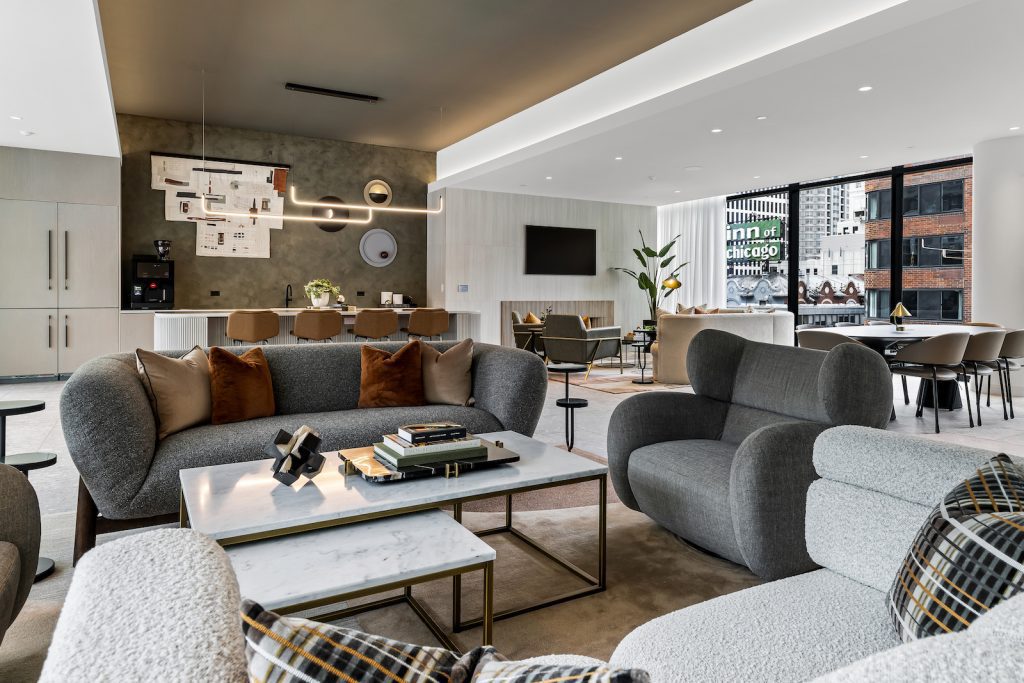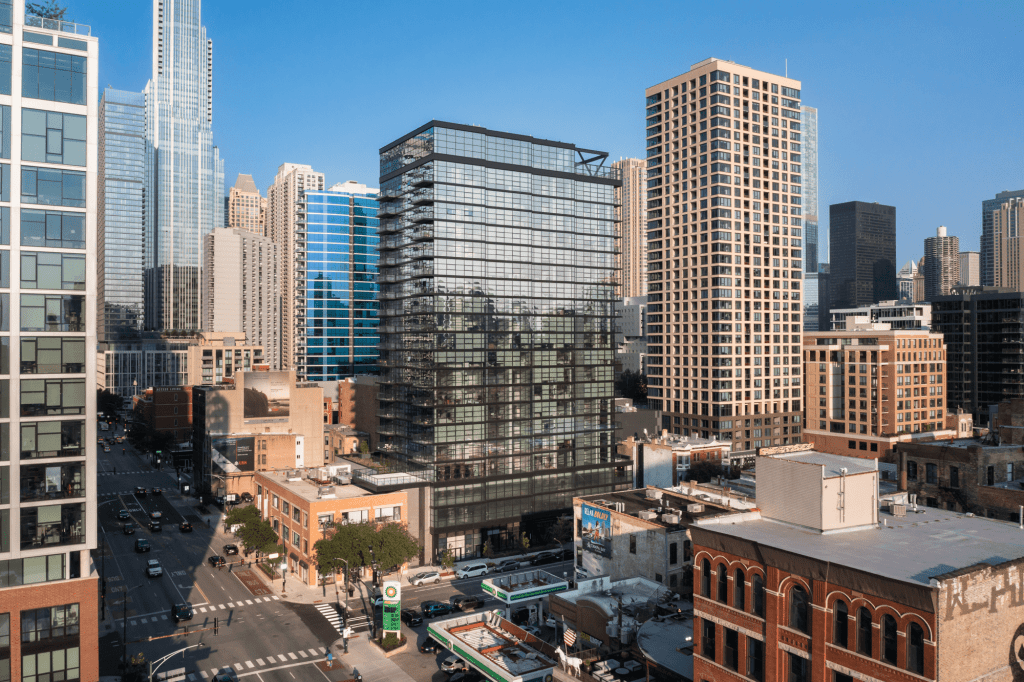Apartment Search
No, using a broker will not limit your exposure to options, it will only help make your search more efficient.
There is a misconception that using a broker will only limit options in your apartment search. That is hardly ever the case.
There are thousands of apartments across the city of Chicago, making it nearly impossible to comb through it all on your own.
Our leasing agents are well-versed in the market and have the most up to date information on pricing and availability all throughout Chicago. We help to uncover exactly what you’re looking for, and pair your criteria with a list of units that best match your wishlist.
Read more from our clients about how we were able to help streamline their search to find an apartment that fits all of their must-haves.
A 1-bedroom + den apartment is a 1-bedroom apartment with an extra alcove that can be used for a variety of purposes.
A one bedroom den apartment typically refers to a type of apartment that has one separate bedroom, and an additional room or alcove that is referred to as a “den.” This additional room can be used for a variety of purposes, such as a home office, a guest room, exercise room, or an extra living space.
Head over to our blog for more information on den apartments or to gather ideas on how to use your new den space.
Revisiting the One Bedroom Den Layout and Why It’s So Popular in Chicago
834 sq. ft. is the average square footage across Chicago high-rise apartments.
The average square footage for a high-rise Chicago apartment can vary depending on your floor plan. Generally speaking, the average square footage across all Chicago apartments is 834 sq. ft.
When breaking this out by floor plan, the average square footage looks like the following:
- Average square footage for a Studio apartment in Chicago – 539 sq. ft.
- Average square footage for a 1-bedroom apartment in Chicago – 743 sq. ft.
- Average square footage for a 2-bedroom apartment in Chicago – 1,142 sq. ft.
- Average square footage for a 3-bedroom apartment in Chicago – 1,643 sq. ft.
- Average square footage for a 4-bedroom apartment in Chicago – 2,721 sq. ft.
The day your lease starts!
In Chicago, you are not limited to having your lease start on the 1st or 15th of each month, you can move in 365 days a year and you only pay the prorated monthly payments for the first month.
The best time of year to move in Chicago depends on what you’re looking for.
Spring and summer are peak times to look for a Chicago apartment. Due to this demand at this time of year, you’ll find the highest pricing, but you will also find the most availability across many of Chicago’s downtown apartments.
While moving to Chicago in the winter can be challenging to navigate because of the cold and snow, if you are looking to capitalize on slightly lower pricing, then this is a great time to start a lease. Our data shows rent prices in Chicago in the winter months can be $100-$200 lower per month. That definitely adds up over the year!
We recommend starting your Chicago apartment search 30-60 days before your move-by date.
In order to decide when the best time to move in Chicago is, you will first need to answer the question of “When do you need to move?”. For example, are you relocating to Chicago for work and need to be settled into your new apartment before your first day? Or, is your lease coming up at your current apartment and you want to have a few days to transition to your next apartment?
After you determine your move-by date, it’s time to start preparing to shop for apartments. A good rule of thumb to start touring apartments is 30-60 days before your move date. At this time, properties will have updated pricing and availability for a move-in that will occur during that time frame.
That being said, it’s never to early to map out a solid game plan for your Chicago apartment search. Get in touch with us today to get started!
Our listings have a price range because pricing and availability changes daily.
The lower end of the price range is typically reflective of smaller layouts on lower floors, whereas the higher end represents availability on higher floors with epics views and premium features.
Bring a valid photo ID, a notebook and pen, a tape measure, and your cellphone on your apartment tour.
Many of our clients ask what they should bring with them when touring luxury Chicago apartments. Whether you’re looking at one or two places or you have an entire day full of showings, there are a few things a renter should come prepared with when looking for downtown Chicago apartments:
- Valid Photo ID: It is absolutely essential to bring along a photo ID when touring apartments in Chicago. Each building places an emphasis on security, so no one will be permitted to tour apartments without proper identification.
- Notebook & Pen or Tablet: It’s helpful to bring along a small notepad and pen, or come prepared with a tablet/phone for taking notes. This way you can make notes about each property, including the things you liked best and any additional information to help in your decision-making process.
- Tape Measure: You’ll receive floor plans with square footage and dimension information about each apartment when on tour with a Luxury Living team member, but it’s still helpful to bring along a tape measure to make sure any specific pieces of furniture you have will fit the way you envision.
- Phone or Camera: Bring along a digital camera or smartphone to snap a few photos in each unit, particularly of the view from the apartment to jog your memory post-showing.
When you’re ready to apply, you will need a credit card to pay the admin fee and criminal background screening to secure your apartment. There are no security deposits in Chicago.
Be prepared to have your income verification for the lease approval process, which can be in either form of:
- A formal offer letter
- The last two months of paystubs
If you are a student, be prepared to have a cosigner or guarantor for the approval process.
Depending on where you are in your apartment search, we recommend one of three ways to begin your apartment search:
1. Don’t have the time? Contact us
>> If you simply don’t have the time to search around for apartments (or just don’t want to!), our team of experienced professionals can do all the heavy lifting for you. Upon initial contact, your leasing agent will help you narrow down your search criteria, send you a list of apartments based on your criteria, and schedule a full day of tours at your top picks. It’s as easy as that!
2. Want to explore on your own? Search available apartments
>> If you know your apartment search criteria and want to be a little more hands on, you can start by exploring currently available apartment listings on your own. To help keep track of your favorites, be sure to create an account so you can save your “favorites”. From there, our team will be in touch to discuss more about what you’re looking for, in addtiion to setting up tours at any apartments you wish to see.
3. New to the city? Explore Chicago’s neighborhoods
>> If you’re new to the city, exploring the various Chicago neighborhoods may be a great place to start. Each neighborhood offers a different lifestyle, and we suggest finding one that suits you the best! While our agents can most definitely help you narrow this down, we also have plenty of neighborhood resources for you to dig in to if you would like to learn more at your own speed.
Costs
Traditionally there are no move-in fees required in Chicago (and no security deposits!)
While you won’t see the typical move-in fee like you would in other cities, there are a few fees to be on the lookout for during your apartment search. Some common fees that you might expect to pay in Chicago include:
- First month’s rent: This is the amount of rent that is due upon move-in for your first month in the apartment.
- Application fee: This fee is used to cover the cost of running background and credit checks on prospective tenants. It typically ranges from $450-$500.
- Pet deposit: If you have a pet, you may be required to pay an additional deposit, usually a one-time non-refundable fee to cover any potential damages caused by your pet.
- Move-in fee: While traditionally there are no move-in fees required in Chicago, some landlords may decide to charge a move-in fee, which is usually a one-time non-refundable fee that covers the cost of administrative tasks such as preparing the unit for move-in.
Overall, while move-in fees are usually little to none, there are a few fees to look out for when moving into a Chicago apartment. It’s always best to review your lease agreement and ask the management company about any additional fees before signing a lease.
This answer depends on a variety of factors, but a rough estimate of a living wage in Chicago is around $70,000 per year.
The salary needed to live in Chicago can vary depending on factors such as your housing costs, lifestyle, and overall expenses. However, a rough estimate of a living wage in Chicago is around $70,000 per year for an individual and $100,000 for a family of four. This estimate takes into account the average cost of living in Chicago, including housing, food, transportation, healthcare, and other expenses.
However, it’s important to note that cost of living in Chicago can vary widely depending on the neighborhood, so it’s always best to research the specific area where you plan to live.
No, there is no broker fee when touring apartments in Chicago.
You should never be charged a broker fee for using a leasing agent in Chicago. Instead, Chicago apartment finders get paid a commission by the property management company or landlord when you rent an apartment they show you.
For more information on how apartment finders get paid, click here.
If you have a good credit score and a stable income, you may not need a cosigner or guarantor for an apartment.
Whether or not you will need a cosigner or guarantor for a Chicago apartment will depend on the landlord or property management company’s requirements, as well as your own credit and financial situation.
In general, landlords and property management companies will check your credit and income to determine your eligibility for an apartment. If you have a good credit score and a stable income, you may not need a cosigner or guarantor.
However, if you have poor credit or no credit history, or if your income is not high enough to meet the landlord’s requirements, you may need a cosigner or guarantor to secure an apartment.
Click here for the difference between a cosigner and a guarantor.
$3,101 is the average rent price for a Chicago apartment.
The average square footage for a high-rise Chicago apartment can vary depending on your floor plan. Generally speaking, the average rent price across all Chicago apartments is $3,101/month.
When breaking this out by floor plan, the average rent price looks like the following:
- Average rent price for a Studio apartment in Chicago – $2,156
- Average rent price for a 1-bedroom apartment in Chicago – $2,712
- Average rent price for a 2-bedroom apartment in Chicago – $4,005
- Average rent price for a 3-bedroom apartment in Chicago – $6,919
- Average rent price for a 4-bedroom apartment in Chicago – $10,949
Additionally, rent prices can also fluctuate based on the neighborhood you reside in. For example, 1-bedroom apartments across the city can range by several hundreds of dollars:
- Average rent price for a 1-bedroom apartment in River North – $2,939
- Average rent price for a 1-bedroom apartment in West Loop – $2,696
- Average rent price for a 1-bedroom apartment in The Loop – $2,745
- Average rent price for a 1-bedroom apartment in Streeterville – $3,015
- Average rent price for a 1-bedroom apartment in South Loop – $2,381
It generally takes 3-5 business days once you provide all of the required documents.
The time it takes to be approved for an apartment once you apply can vary depending on a number of factors such as the screening process, number of applicants, and availability of the unit. In general, the process can take anywhere from a few days to a few weeks.
Typically, once you submit your application and the required documentation, the landlord or property management company will begin the screening process. This can include checking your credit score, verifying your income and employment, and checking your rental history.
If your application is accepted, the landlord or property management company will typically contact you to schedule a lease signing and move-in date. If your application is denied, the landlord or property management company is required by law to provide the reason why.
To help expedite the process, be sure to bring a valid photo ID issued by the government and proper income verification when you sign.
It’s important to keep in mind that the process can take longer during busy rental seasons, such as the summer months, when there are more applicants for fewer available units.
The answer to “How much does it cost to live in Chicago” can vary depending on various factors, including your lifestyle, neighborhood, number of people in your household, and more.
To help get a better sense of how the cost of living in Chicago looks for you, check out our Cost of Living in Chicago blog here.
We recommend aiming to budget $100-150/month for utilities in a Chicago apartment*
Apartment renters should budget $100-$150 per month for utilities, but these numbers can fluctuate depending on the building and what they cover. In most apartments, you will be responsible for paying electricity, gas, and internet/cable bills, as the buildings typically cover water, sewer, and garbage.
- Electricity: The average cost for electricity in Chicago is $105.49 per month. This is most likely going to be the most expensive of the utilities, especially during the warmer months when the AC is constantly running.
- Gas: The average cost for gas in Chicago is $96.99 per month.
- Internet: The average cost for internet (60Mbps) in Chicago is $61.15. Depending on the internet speed you need, this cost may fluctuate. If you don’t mind a slower connection, you can keep costs down a bit more here.
- Cable: The national average for cable is $100. As cable alternatives start to gain traction, you can also cut this expense if you wish and go with a cheaper option with a select few of your favorite channels. A few of these cable alternative options are Sling TV for $35 a month, Hulu with Live TV for $64.99 a month, or YouTube TV for $64.99 a month.
- Water: The national average cost for water is $40, but you most likely won’t have to worry about this cost in your apartment.
- Sewer/Garbage: The city of Chicago charges a $9.50 per month garbage fee for each unit, but this will most likely be handled by your apartment building.
*Note: Costs are dependent on unit type and tend to be higher for larger apartments.
On average, you can expect to pay anywhere from $X-$X for an apartment in Chicago.
What you can expect to pay for an apartment can vary drastically based on a number of factors, including the floor plan, neighborhood, season, concessions offered, and more. These factors can cause one’s rent to fluctuate hundreds of dollars.
Working with a broker can help you stay within your budget while mitigating headaches of the ever-changing rental market. Apartment brokers know the latest deals and most up-to-date pricing across all of Chicago, so you don’t have to keep tabs yourself.
For a closer look into today’s apartment pricing, explore the current rent ranges in some of Chicago’s neighborhoods here.
A cosigner on an apartment is someone who signs a lease with you and assumes equal liability for paying the rent, while a guarantor is only liable to make payments when the primary borrower can’t or won’t pay.
A cosigner and a guarantor are both people who are financially responsible for someone else’s rent. However, there are some key differences between the two terms:
A cosigner is someone who signs a lease with the primary resident, and is equally responsible for repaying the rent. The cosigner’s credit and income are taken into account when determining the primary resident’s eligibility for the apartment. Cosigners are typically used when the primary renter has little credit history or a low credit score.
A guarantor, on the other hand, is someone who guarantees to pay the rent if the primary resident is unable to do so. A guarantor is typically used when the primary tenant has poor credit or no credit history, and is not able to secure an apartment on their own.
In both cases, the cosigner or guarantor will be equally responsible for the rent of the primary resident, and will be held liable if the primary resident fails to pay.
It’s important to note that being a cosigner or a guarantor is a serious responsibility and should not be taken lightly, as it can have a significant impact on the person’s credit and financial well-being. Before agreeing to cosign or guarantee someone else’s debts or obligations, it’s important to carefully consider the risks and potential consequences.
On average, you can afford 33% of your paycheck in rent.
Most real estate experts advise renters to spend anywhere between 25-35 percent. The percentage of rent you spend depends mainly on the cost of living and what kind of apartment you’re looking for.
As a general rule of thumb, most apartments in Chicago require an income verification of 3x your gross monthly rent. However, if you do not meet that requirement, there are other ways you can be approved, either through a cosigner or guarantor.
For more information on the question of “How much rent can I afford?”, read more on our blog.
Apartment finders get paid a commission by the property management company or landlord when you rent an apartment they show you, meaning we are a comlimentary service to you as a renter.
There is a misconception if you work with a broker or apartment finder, you won’t get a good deal because the property or landlord needs to pay out a commission. This is not the case. If you find a good rental broker to help with your search, you even have a chance of paying a little less in upfront fees. Due to fair housing laws, whether you tour on your own or work with a broker, properties in the city of Chicago legally have to provide you with the exact same pricing, promotions, concessions, etc.
Chicago rental brokers should never charge a client for using their services. If anyone asks for an upfront fee, you should not work with them. Unlike some cities, such as New York or Boston, in Chicago, the renter does not owe any fees to their broker for working with them to find an apartment.
When working with a real estate agent to rent an apartment, the agent is only paid a commission if you rent an apartment they show you. The commission is paid out by the property management company or landlord for the apartment after you move in.
Because you are working with a broker doesn’t mean you can’t also see apartments on your own, however be mindful your broker is paid on commission so if you are going to look at other properties without them, it’s best to be transparent.
Neighborhood
Some of the best neighborhoods in Chicago for young professionals include River North, West Loop/Fulton Market, Streeterville, Lincoln Park, and Wicker Park.
Chicago has many diverse neighborhoods, each with its own unique character and amenities. Some Chicago neighborhoods that are popular among young professionals include:
- River North: This neighborhood is known for its trendy bars, restaurants, and nightlife, as well as its proximity to the Loop’s business district and the Magnificent Mile for shopping and entertainment.
- West Loop/Fulton Market: This neighborhood has a growing number of young professionals and is known for its trendy restaurants, nightlife, and proximity to the Loop.
- Streeterville: This neighborhood is home to many young professionals working in the medical and technology fields. It’s known for its high-rise apartment buildings, lakefront parks and proximity to the Magnificent Mile shopping and entertainment district.
- Lincoln Park: This neighborhood is known for its tree-lined streets, parks, and proximity to the lake. It is popular among young professionals for its abundance of restaurants, bars, and shops.
- Wicker Park: This neighborhood is known for its hip and trendy vibe, with many young professionals, artists, and musicians calling it home.
For a deeper dive into each of these neighborhoods, read our neighborhood guides.
In short, yes, Chicago is as cold as you hear.
Chicago is known for its cold winters and is often considered one of the coldest major cities in the United States. The city has a continental climate, which means that it experiences a wide range of temperatures, with cold winters and hot summers. The average temperature in Chicago in the winter months (December-February) is around 20°F (-6°C), but temperatures can drop well below 0°F (-18°C) with wind chill. It is also common to have snowfall during the winter months.
Despite the chilly temps during Chicago winters, many residents choose to stick it out for the city’s incredible summer months. Until then, check out our blog for more tips on making the most of the chilly weather.
Some of the top neighborhoods in downtown Chicago include The Loop, River North, Streeterville, West Loop, South Loop, and Gold Coast.
Downtown Chicago is made up of several neighborhoods, each with its own unique characteristics and attractions. Some of the top neighborhoods in downtown Chicago include:
- The Loop: Also known as the central business district of Chicago, The Loop is home to many of the city’s major skyscrapers and corporate headquarters, as well as various cultural institutions including the Art Institute of Chicago and Millennium Park.
- River North: This neighborhood is home to many of the city’s top art galleries, restaurants, nightlife, and hotels.
- Streeterville: This Chicago neighborhood is located just east of the River North and is home to various high-end shops and restaurants, as well as the Magnificent Mile.
- West Loop: Named after its location west of the Loop, this lively neighborhood is known for its trendy restaurants, bars, and nightlife. The United Center is also situated in the West Loop area, which is the home of the Chicago Bulls and Blackhawks.
- South Loop: Situated just south of the Loop, this Chicago neighborhood houses the city’s major cultural institutions, such as the Field Museum and the Museum of Science and Industry.
- Gold Coast: This neighborhood is located on the north side of downtown and is known for its historic architecture and high-end shops and restaurants, as well as some of the city’s most exclusive residential buildings.
For more information on each of these downtown Chicago neighborhoods, head over to our Chicago neighborhood pages.
Some of the top dog-friendly downtown Chicago neighborhoods include Lincoln Park, West Loop, and Streeterville.
Downtown Chicago is a bustling and vibrant area with many different neighborhoods to choose from. However, when it comes to being dog-friendly, some areas may be more accommodating than others. Here are some of the best dog-friendly downtown Chicago neighborhoods:
-Lincoln Park: This neighborhood is known for its lakefront location and various dog-friendly parks, including Lincoln Park, Oz Park, and Wiggly Field.
-West Loop/Fulton Market: In addition to this area’s vibrant food and drink scene offering various pet-friendly patios, West Loop and Fulton Market also houses many dog-friendly parks such as the Mary Bartelme Park and Skinner Park.
-Streeterville: With a prime lakefront location and the miles of walking paths along the Lakefront Trail, Streeterville is another Chicago neighborhood known for it’s top-notch dog-friendly amenities.
These neighborhoods are generally known for being dog-friendly, with plenty of green spaces, parks and dog-friendly restaurants, cafes and shops. However, it’s always a good idea to check with the individual building or complex you are interested in to confirm they are pet-friendly before signing a lease.
If you can’t decide where to live in Chicago, take our Chicago Neighborhood Quiz to find out.
This answer can vary greatly depending on your interests and lifestyle. While there are many incredible neighborhoods all throughout Chicago, you may find that one area suits your needs more than another. Take our Chicago Neighborhood quiz to find out which downtown Chicago neighborhood best fits your lifestyle.
Some of the top companies headquarted in Chicago include Boeing, McDonald’s, Exelon, and Kraft Heinz, along with many others.
As one of the country’s largest cities, it’s no surprise that many large, successful companies have chosen the Windy City as their headquarters. Over the past few years, Chicago has seen an influx of Fortune 500 companies choosing to expand or relocate their headquarters to the city.
A few companies headquartered in Chicago include:
- Boeing
- McDonald’s
- Mondelez International
- Motorola Solutions
- Exelon
- Kraft Heinz
- Conagra Brands
To uncover more companies headquartered in Chicago, read our blog.
Overall, Chicago is a generally safe city to live in.
Chicago is a large and diverse city with many safe neighborhoods, but like any major city, it also has areas that may be considered more dangerous. Overall, crime rates in Chicago have been decreasing in recent years.
Luxury Living specializes in the most sought-after neighborhoods, which are considered safe for residents, tourists and visitors. The city has a number of neighborhoods that have low crime rates and offer a variety of amenities.
However, some neighborhoods in the city may have higher crime rates and may not be as safe. It’s important to research and consider the crime statistics of a neighborhood before deciding to live there.
It’s also important to take common sense precautions to stay safe, such as being aware of your surroundings, avoiding walking alone at night in unfamiliar areas, and keeping valuables out of sight.
The city of Chicago has a robust police department, and many neighborhoods have community policing programs that work to increase safety and security. It is also worth noting that the city is equipped with a CCTV system, which can be helpful for the police to track down criminals.
Overall, Chicago is a generally safe city to live in, but like any major city, it’s important to be aware of potential dangers and take steps to stay safe.
Our Process
Market rent is the price of rent before concessions are applied, while net rent is the prorated monthly rent inclusive of concessions.
Market rent is the list price of your apartment, or the price per month of your lease before the concessions are applied.
Net rent is found by taking your total concession (i.e. one or a few months free) and dividing it over the course of your lease term. The result will be your monthly, prorated payments.
For Example:
Market Rent = $3,000/month
Concession = 1 month free on a 12 month lease
Net Rent = $2,750/month
If you have any questions about these numbers, your leasing agent will be able to break down the pricing and help you make a more informed decision in your apartment search.
Yes, you can transfer apartments in Chicago.
Transferring apartments typically means moving from one apartment to another within the same complex or building, rather than moving to a different location.
This can involve filling out paperwork and going through a process with the landlord or management company to change the lease from one unit to another. In some cases, there may be fees associated with transferring apartments.
Head over to our blog for more information on transferring apartments:
At Luxury Living, we define “luxury” as a quality of life.
Luxury living may mean having a home-office with breathtaking views from your apartment’s floor-to-ceiling windows, or being within walking distance to your favorite restaurants and activities. Whatever luxury means to you, let us help you find it.
MOST POPULAR
Learn More On The Blog

High-Rise Chicago Living: The Ultimate Guide to Sky-High Luxury
There’s something special about waking up to a panoramic view of Chicago’s skyline or stepping into a sleek, modern lobby that feels more like […]

Best Luxury Apartments in Chicago: 2025 Edition
Not long ago, luxury living was defined by grandeur — crystal chandeliers, private penthouses, and oversized sunken tubs. But today, it’s more about effortless […]

What to Bring to an Apartment Viewing in 2025: Essential Tips for Chicago Renters
Searching for a luxury apartment in Chicago in 2025? Whether you’re relocating or upgrading your lifestyle, being fully prepared for an apartment viewing is […]

Things to Know Before Moving to Chicago: What No One Tells You (But Should!)
Moving to Chicago is an adventure filled with towering skyscrapers, world-class dining, and vibrant neighborhoods that each have their own personality. But beyond the […]

